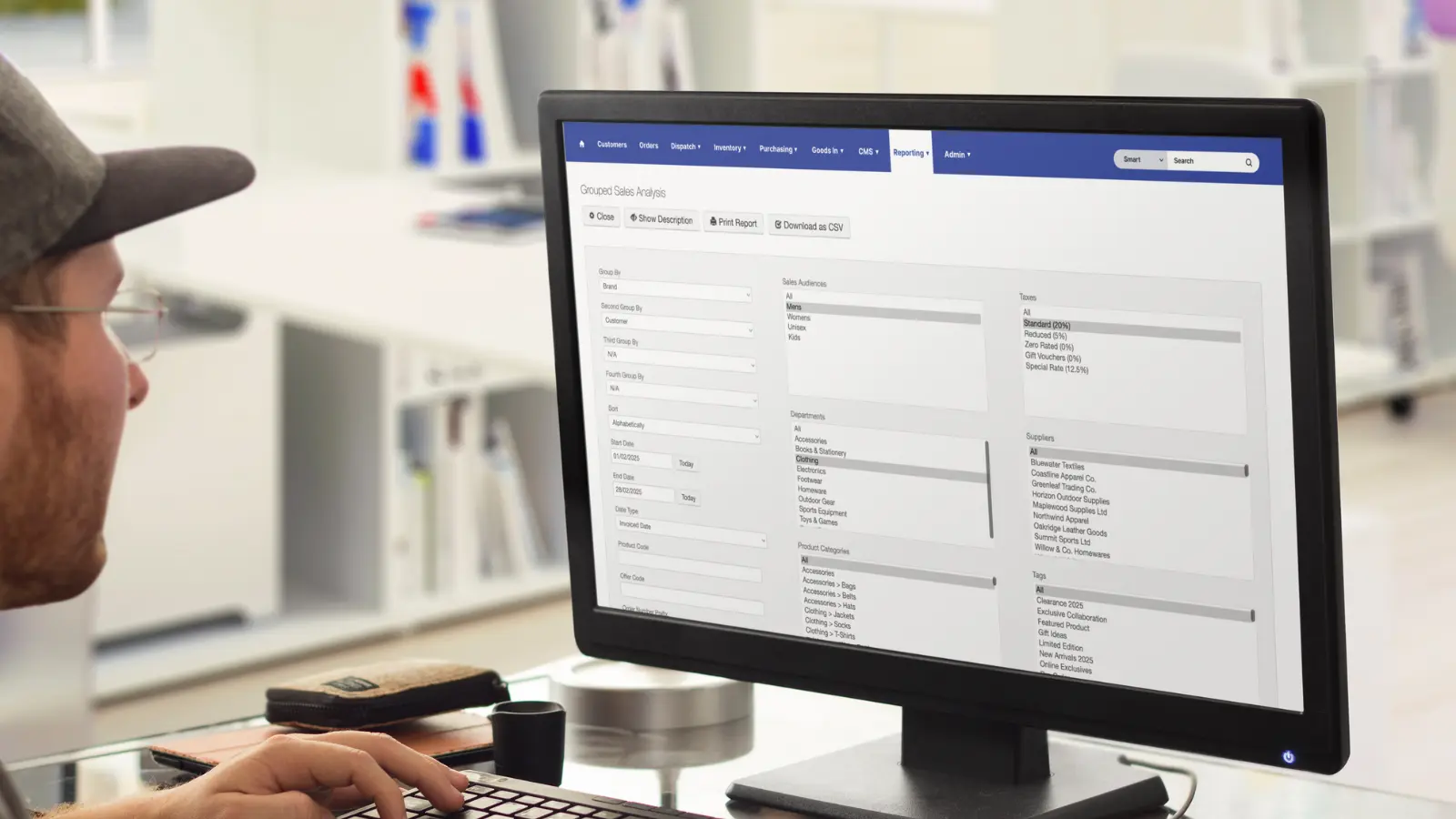Welcome back to the newest instalment in our ongoing series of industry spotlight articles.
This month we are reviewing the industrial sector, focusing on how these often-traditional businesses are beginning to embrace digital transformation to improve their operational efficiency, provide better experiences for their customers and differentiate themselves from the competition.
But first, what is industrial eCommerce?
Industrial eCommerce covers the trading of goods tailored for industrial applications, namely in manufacturing, construction, and maintenance.
This encompasses an array of products, covering raw materials, parts, major equipment, accessory equipment and operating supplies. Therefore, industrial eCommerce is predominantly oriented towards business-to-business (B2B) transactions.

Digital adoption has been historically low
In 2021, a research study conducted by McKinsey focused on industrial companies and their existing eCommerce capabilities unveiled that:
“Only 13 percent of industrial OEMs (original equipment manufacturers) say that they can offer digital solutions with their current capabilities, and only 10 per cent offer online, automatic self-service tools for placing reorders.”
The sector is slowly beginning to embrace industrial eCommerce but they are some way behind others in their adoption of technology.
Why is this the case? There are several reasons for this:
Complex product catalogues
Industrial product mixes are often complex and specialised, one product can have dozens of variations based on very specific technical attributes.
This makes it challenging to deliver an effective user experience as the eCommerce website must incorporate an intuitive filter system, site search and navigation functionalities to help users find the products they are looking for.
Many industrial products require customisation or configuration to suit specific client needs. Implementing these options seamlessly on an eCommerce platform can be technically demanding.
Transitioning these products to an online platform while maintaining accurate and comprehensive information is, therefore, impossible using off-the-shelf eCommerce solutions. Industrial businesses require powerful eCommerce PIM solutions.
Longer, relationship-based B2B sales cycles
Industrial products often involve long sales cycles and significant financial investments. This can lead to a preference for traditional sales channels where direct interactions and negotiations play a vital role.
As a result, the sector relies heavily on established relationships between buyers and suppliers. This traditional approach to business emphasises trust, which is harder to build through a purely digital experience where product discovery, order placement and customer support are all handled online.
Lack of expertise
Some traditional industrial companies may lack the in-house expertise to navigate the complexities of digital transformation. Adapting to new technologies and strategies requires a different skill set that these companies might need to develop.

Why does the industrial sector need to embrace digital?
Despite these challenges, the industrial sector is gradually recognising the benefits of digital transformation and eCommerce.
In short, they are:
- Keeping up with the changing demands of their trade customers. Another McKinsey report states: 60% of B2B customers find remote sales at least as effective as traditional sales, and 62% prefer to reorder products online.
- Improve their operational efficiency through smarter order, product, inventory and customer management.
- Differentiate themselves from their competitors by providing an engaging, effective online purchasing experience.
- Reaching more potential customers by expanding their digital footprint.
The challenge is to build an eCommerce strategy that achieves these benefits whilst still acknowledging the niche requirements of their industry environment.
How is the industrial sector beginning to make strides forward?
There are several ways that industrial firms are beginning to utilise technology for commercial benefit.
Using an integrated ERP solution
One avenue of exploration involves leveraging powerful eCommerce platforms that are integrated with or possess their own Enterprise Resource Planning (ERP) functionalities.
B2B transactions can be complex, involving bulk orders, negotiated pricing, specialised contracts, and integration with procurement systems.
This has proven to be one of the biggest challenges for industrial businesses that are considering a full eCommerce strategy.
Because of how complex these processes can be, particularly concerning distributor management, industrial companies have historically opted for brochure websites encouraging traditional B2B sales methods.
This meant that orders could be manually processed and documented according to the business’ internal methodology, allowing them to meticulously manage their stock levels.
By using an eCommerce platform with integrated ERP capabilities the business can begin to take those online orders, comfortable in the knowledge that they have a platform in place to harmonise sales, inventory and supply chain management.
This integration ensures data synchronisation, enabling efficient order processing and accurate inventory management. With real-time insights into inventory levels and order statuses, the business is empowered to make more informed decision-making and proactively respond to changes in demand.
Differentiating themselves through outstanding experiences
In today's digital age, the significance of a strong online presence cannot be overstated.
In an industry that has conventionally adhered to its traditional norms, industrial businesses are beginning to invest in improved website design and customer management tools to separate themselves from their competitors.
Experience can be split into two fundamental components: user experience (UX), driven by the website, and customer experience (CX), driven by the eCommerce platform.
User experience
Firstly, the user experience encompasses the entirety of a visitor's interaction with the website. It involves every aspect, from navigation and aesthetics to content presentation and functionality.
A well-crafted industrial eCommerce UX can be a truly differentiating factor, as it will allow users to browse a complex product mix and find a very specific product that meets their requirements.
A smooth navigation, intuitive layout, site search and filtering functionality collectively contribute to an environment where visitors can seamlessly engage with industrial products and make purchases.
Website personalisation can also be leveraged to help industrial companies meet complex customer requirements.
By giving customers the freedom to organise the website based on their preferences, such as creating custom categories of their go-to products for ease of use, they can find products they are interested in faster and more efficiently, which can improve their overall satisfaction with the website.
Customer experience (CX)
Secondly, customer experience extends beyond the initial purchase. It covers the journey a customer embarks on after placing an order, encompassing interactions and engagements post-purchase.
In an industry where excellent customer management is critical to the success of the business, businesses can leverage technology to automate order tracking, provide proactive notifications, and personalise follow-ups.
Not only does this modernise and improve the experience, but it also serves to reduce the manual workload placed on internal customer management teams who would otherwise be sending updates out directly to the customers in their care.
Enabling customer service executives to curate baskets for their clients provides some level of middle ground between the traditional B2B sales methodology and digital transformation. This process involves the executives discussing requirements with the customer, and building a basket for them to log in and purchase.
Embracing new digital marketing techniques
Industrial companies have traditionally marketed themselves through conventional methods rooted in print media, trade shows, and direct sales. Print advertisements in industry-specific magazines and catalogues allowed them to showcase products and solutions to a targeted audience.
While effective, these methods have limitations in reach and speed. The digital era has prompted a shift towards online strategies, enabling broader visibility, data-driven insights, and more dynamic engagement for industrial firms in their marketing endeavours.
Reaching customers where they're searching is a core aspect of industrial companies' shift towards eCommerce digital marketing services.
As potential customers increasingly turn to search engines for information and solutions, industrial businesses are recognising the need to be present where their audience is actively looking. This is particularly important for businesses that offer repair and maintenance products, as they are driven by time-of-need demand exercised through a search engine like Google.
By strategically utilising search engine optimisation (SEO) and paid search practices, these companies position themselves to appear prominently in relevant search results and discussions - but this can only be delivered and optimised if the business has first invested in a robust eCommerce website and management platform.
Are there still hesitations?
Industrial companies often have legitimate hesitations when considering digital transformation due to various concerns and challenges that can arise from adopting new technologies and changing established processes.
The plethora of digital tools and technologies available can be overwhelming for companies attempting to choose the right ones for their specific needs. The fear of making the wrong choices can lead to hesitations, with the business reverting to existing processes out of fear of change.
Implementing digital transformation can involve significant upfront costs, including technology adoption, employee training, and process redesign. Companies may hesitate due to uncertainty about the return on investment (ROI) and how long it will take to see tangible benefits.
Some companies might be sceptical about the actual benefits of digital transformation, especially if they've seen other companies struggle to achieve promised improvements.
Final thoughts
A transformative shift is underway as industrial companies continue to embrace eCommerce. By harnessing a full eCommerce strategy, these businesses stand to streamline operations, drive great efficiencies, enhance their customer experiences and unlock new avenues for sales growth - but this must be done so in a way that retains the core service methods that their long-term customers expect.
We offer all of the eCommerce solutions necessary to achieve this, including game-changing website development and unobtainable technology that is suited to complex industrial requirements.
If you would like to discuss what we can offer in more detail, don’t hesitate to contact us.
Our recent posts
Keep up to date with the latest news and insight from the team at Venditan
-p-2600.webp)









